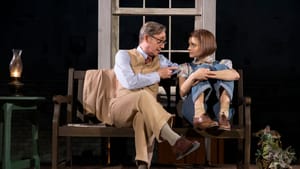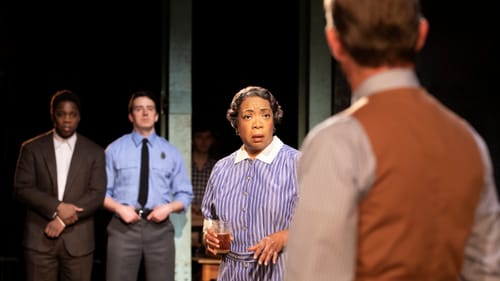Stay in the Loop
BSR publishes on a weekly schedule, with an email newsletter every Wednesday and Thursday morning. There’s no paywall, and subscribing is always free.
Shockingly relevant
The Kimmel Cultural Campus presents the national tour of Aaron Sorkin’s To Kill a Mockingbird

In a nation struggling to reconcile the massive gap between what it is and what it strives to be, Aaron Sorkin's new stage adaptation of Harper Lee’s To Kill a Mockingbird feels shockingly relevant. The national tour production, which stops here in Philadelphia through July 24, 2022, transforms the author’s 62-year-old story into a contemporary critique of civility and the rule of law.
The characters we know and love are still very much a part of Sorkin's rendition of Lee's Pulitzer Prize-winning novel, but his vision of Maycomb, Alabama, is a biting reflection of where we are now: a country obsessed with "the way things were" and "how the Founding Fathers intended it" without wanting to actually lift the (white) hood and see the deeply flawed beings underneath.
Old characters, new complexity
Actor Richard Thomas (Ozark's Nathan Davis to some, John-Boy Walton to yours truly) delivers a performance of Atticus Finch that manages to hold its own against Gregory Peck's timeless portrayal in the 1962 film while also embracing the complexity of a beloved character in a way we haven't seen before. True, he is "a small-town lawyer who's paid in vegetables," as he quips on his front porch early on, but he's also a man whose belief that people are fundamentally good will be woefully challenged many times over before all is said and done.
Yaegel T. Welch and Jacqueline Williams each shine in their respective roles as Atticus’s doomed client Tom Robinson and the Finch family’s long-serving, long-suffering housekeeper Calpurnia. Written as under-developed, two-dimensional characters in the original novel, here they are full human beings who dominate every scene they’re in. Attendees of the National Tour production are also treated to a performance by Mary Badham, the original Scout in the 1962 film, who takes on the racist, Confederacy-loving elderly neighbor Mrs. Dubose.
Heat and tight spaces
This story unfolds in a non-linear way, shepherded by the young narrators Scout, Jem, and Dill, with the trial of Tom Robinson weaving the whole thing together. As we transition between scenes from the trial and the moments with the children and the adults in their lives, the minimalist set is broken down and restaged by the cast itself.
The overwhelming heat of the Alabama sun is effectively suggested by the extreme lighting in the courtroom scenes. The rest of our story unfolds on the front porch of the Finch family’s humble home and in quiet summer nights, when the children try to coax neighborhood boogeyman Boo Radley into revealing himself. A scene where the children are running through the night to and from the Radley residence is a choreographed dance of the townspeople rearranging Maycomb after dark as our young adventurers haphazardly run over, under, and around alleys and tight spaces.
A drama of contrasts
Sorkin’s capable storytelling invites us into moments and subtext that were obscured or outright omitted from the original source text, like Tom first meeting with Atticus in jail and conversations by the kitchen sink between Atticus and Calpurnia.
“I believe in being respectful,” he tells her during a tense exchange after Jem destroys Mrs. Dubose’s prized garden, retaliation for using a racist epithet to describe his father. “No matter who you’re disrespecting!” she snaps back.

In this version antagonist Bob Ewell’s embrace of white extremism is much more explicit, from uttering to Atticus in passing that Bob is “part of a club with strong convictions,” to his declaration that “white men built America!” under cross-examination during the trial. Ewell’s sexual abuse of his daughter Mayella is also made painfully clear.
Contrast drives the drama. Atticus believes that his neighbors are inherently good, and yet he takes on a mob of them (donning white hoods) as they attempt to lynch Tom before trial. He is convinced the rule of law will prevail, but sits in disbelief when the final verdict against his client comes down. Atticus’s journey is also ours: we truly believe we know the people around us and goodness will prevail, only to be betrayed by the reality we actively chose to ignore.
That some of the most significant plot points happen at night is also telling. Judge Taylor asks Atticus to take Tom’s case in the evening. The children seek out Boo Radley after dark. Ewell and his fellow Klansmen come to lynch Tom late in the night. The shadows and fog offer cover for those who know the difference between right and wrong, but seek the anonymity of the night to carry out their brand of justice.
An important absence
Perhaps the most powerful message shared with us during this rendition of To Kill a Mockingbird comes in the form of a noticeable absence. In every scene inside the Maycomb County courtroom, Atticus defends his case to an empty jury box, a damning statement that, regardless of who sits there, the verdict would always be the same.
As Scout shares early on, “Justice would be decided by ordinary people,” by the same people who would try to lynch an innocent Black man before a shred of evidence was presented. It’s a chilling reminder that as much as everything changes, it stays the same. In their world, and ours.
What, When, Where
To Kill A Mockingbird. By Aaron Sorkin, directed by Bartlett Sher. Through July 24, 2022, at the Academy of Music, 240 S Broad St, Philadelphia, PA 19102. (215) 893-1999 or kimmelculturalcampus.org.
Kimmel Cultural Campus venues welcome mask-wearing, but do not require it.
Accessibility
The Academy of Music is a wheelchair-accessible venue. Wheelchair-accessible seating can be purchased online by calling Patron Services at (215) 893-1999 or by emailing [email protected].
There will be an American Sign Language-interpreted and audio-described performance of To Kill a Mockingbird on Friday, July 22, 2022 at 8pm.
Sign up for our newsletter
All of the week's new articles, all in one place. Sign up for the free weekly BSR newsletters, and don't miss a conversation.

 Marta Rusek
Marta Rusek